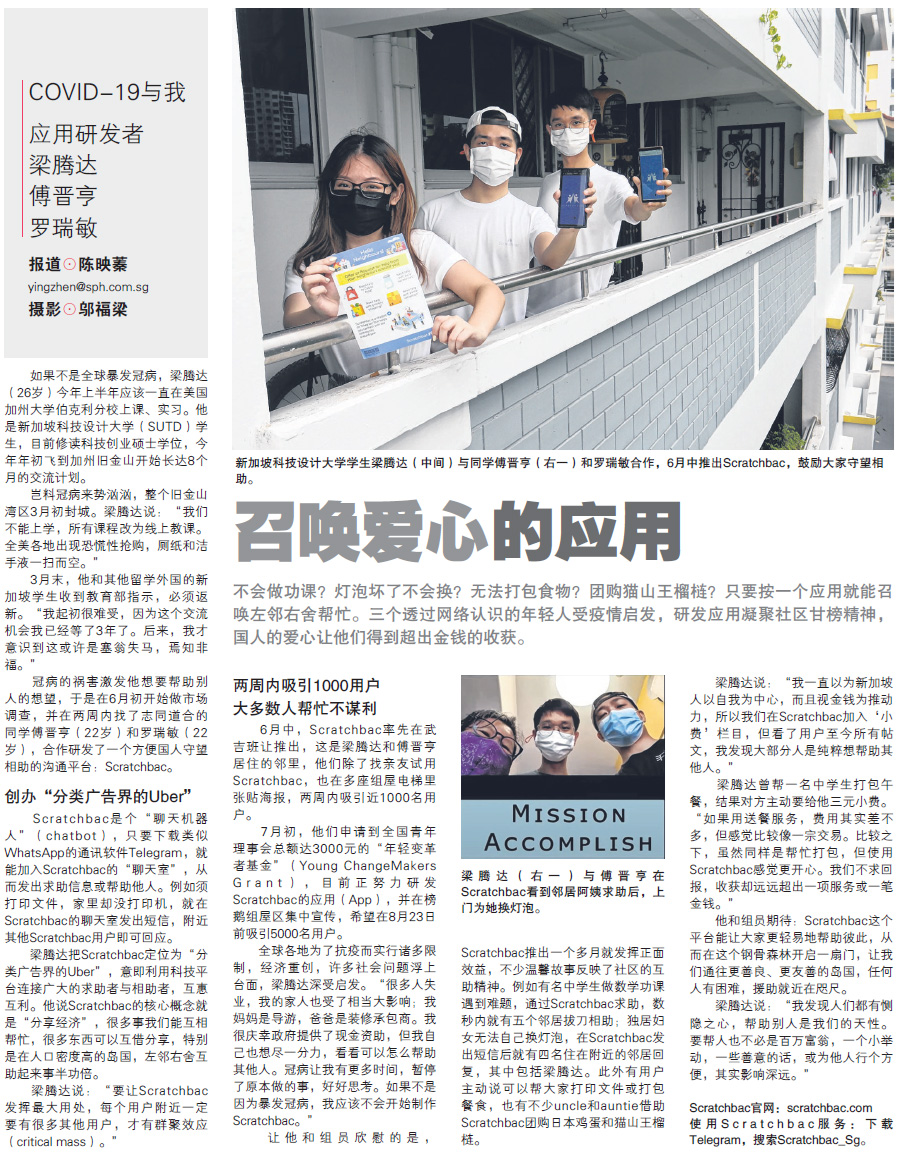App that calls for compassion 召唤爱心的应用
Lianhe Zaobao, 26 Jul 2020, App that calls for compassion (translation)
If not for the global outbreak of the Covid-19 virus, Neo Theng Tat (26 years old) would have been in the United States for the first half of this year attending classes and internships at the University of California, Berkeley. He is a student from the Singapore University of Technology and Design (SUTD), currently studying for his Masters in Technology Entrepreneurship. At the start of the year, he had flown to San Francisco, California to start on the supposed eight-month long exchange programme.
Unexpectedly, the Covid-19 virus swept fiercely throughout San Francisco and the Bay Area was locked down in early March. Neo Theng Tat said: “We could not go to school and all courses were taught online. Panic buying occurred across the United States, and items like toilet paper and hand sanitisers were wiped out.”
At the end of March, he and other Singaporean students studying abroad received instructions from the Ministry of Education to return to Singapore. “I was unhappy at first because I had waited three years for this exchange opportunity. Later on, I realised that this might be a blessing in disguise.”
The scourge of the coronavirus inspired him to want to help others, so he started to do market research in early June and found like-minded people within two weeks. Schoolmates Princeton Poh (22 years old) and Cheryl Low (22 years old) had jointly developed a communication platform, called Scratchbac, that makes it convenient for citizens to help one another.
Founding the ‘Uber in Classified Advertising’
Scratchbac is a chatbot. As long as you download Telegram, a communication software similar to WhatsApp, you can join Scratchbac's "chat room" to send messages requesting for help or to help others. For example, if you need to print a document, but there is no printer at home, you can send a text in the Scratchbac’s chat room and other nearby Scratchbac users can respond.
Neo Theng Tat positioned Scratchbac as the "Uber in classified advertising", by using a technology platform to connect large numbers of people in need and helpers for mutual benefit. He said the key concept behind Scratchbac is the "sharing economy". We can help one another with many things, and we can borrow and share many things, especially on a densely populated island, where neighbors can help each other do more with less.
Neo Theng Tat said: “In order for Scratchbac to be most effective, each user must have many other users nearby to have a critical mass.”
Attracted 1,000 users in two weeks; Most people helped without getting something in return
Scratchbac was launched in Bukit Panjang in mid-June. This is the neighborhood where Neo Theng Tat and Princeton Poh lived. In addition to looking for relatives and friends to try Scratchbac, they also put up posters in the elevators of multiple HDB flats, attracting nearly 1,000 users within two weeks.
In early July, they applied for the National Youth Council’s $3,000 “Young ChangeMakers Grant”. They are currently working hard to develop the Scratchbac application (App) and promoting it in the HDB area of Punggol, with the hopes of attracting 5,000 users by 23 August.
Many restrictions have been imposed to fight the epidemic around the world and the economy has been hit hard, with many social problems being surfaced, Neo Theng Tat explained. "Many people are unemployed, and my family has been greatly affected; my mother is a tour guide and my father is a renovation contractor. I am very fortunate that the government has provided cash assistance, but I also want to do my best to see how I can help others. The coronavirus gave me more time to pause what I was doing and think carefully. If it weren't for the coronavirus outbreak, I wouldn't have created Scratchbac.”
To him and his team members, Scratchbac has achieved positive results within a month of its launch. Many heartwarming stories reflect the spirit of camaraderie within the community. For example, a secondary school student encountered a problem doing math homework and asked for help through Scratchbac, within seconds, five neighbours rendered help; a woman living alone could not change her light bulb, after sending a text message on Scratchbac, four neighbours living nearby responded, including Neo Theng Tat himself.
In addition, some users openly offered to help anyone who needed to print documents or purchase takeaway meals, and many uncles and aunties used Scratchbac to bulk buy various items such as Japanese eggs and Mao Shan Wang durian.
Neo Theng Tat said: "I always thought that Singaporeans are self-centered, motivated by money, so we added a ‘tips’ section to Scratchbac. However, after reading all the posts from users so far, I found that most people are just purely trying to help others.”
Neo Theng Tat once helped a secondary school student buy takeaway lunch, and was offered a $3 tip. “If you use the food delivery service, the cost is actually the same, but it feels more like a transaction. In comparison, although it is also to help with food delivery, it feels more pleasant using Scratchbac as we do not ask for anything in return, but the gain is far beyond a service or a sum of money.”
He and his team members expect the Scratchbac app will make it easier for everyone to help one another, thereby opening a door in this concrete jungle, to allow us to become a kinder and friendlier island nation, where assistance is within reach for anyone in difficulty.
Neo Theng Tat said: “I’ve found that people are compassionate and it is in our nature to help others. You don't have to be a millionaire to help people. A small gesture, some kind words, or to just be accommodating to others, can have far-reaching impact.”
Join the Scratchbac community
Follow Scratchbac on Instagram
